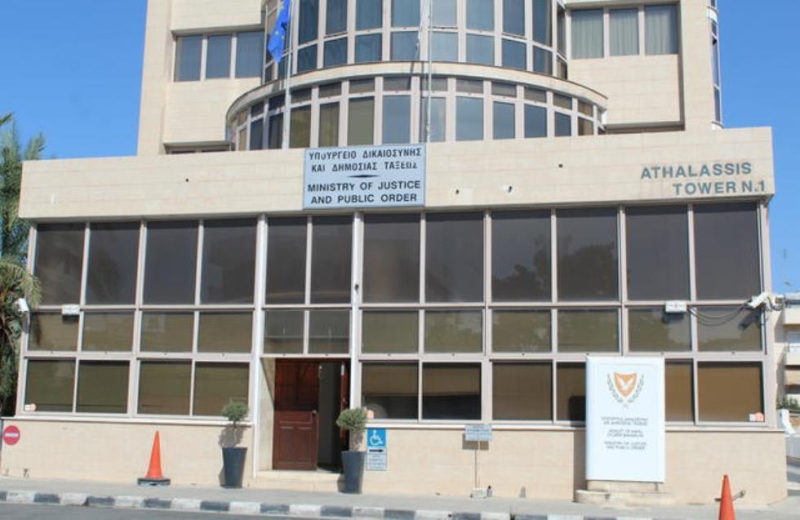
The revised guide explains the procedures for reporting corruption in the workplace, as well as the protections enjoyed by employee whistleblowers who in a complaint at their workplace, either in the public or private sector
The Ministry of Justice and Public Order posted on its website a few days ago the revised guide for public and private sector employees who report acts of corruption in their workplace. The guide explains in detail the current legislation passed in February 2022, as well as the recent changes that have taken place and aim to create an effective and strong legal framework to protect public and private sector workers who disclose information and data about transactions of corruption.
In particular, the existing legislation encourages and facilitates employees to submit complaints about acts of corruption in their workplace through safe procedures, in a confidential context. At the same time, the law prohibits any retaliatory action against them by their superiors or colleagues, and provides for strong support measures. The purpose of the revised Guide, prepared by the Ministry of Justice in collaboration with the Legislation Commissioner, is to explain the basic provisions of the law and to inform employees of their rights and obligations under the law. The guide first points out which persons can disclose information, what kind of violations this information can concern and where they can be addressed. Next, the conditions under which someone can be protected, the protection measures enjoyed by these persons, but also the consequences of violating the provisions of the law are analyzed. In particular:
Who can file a complaint?
A person who through his work environment became aware of or came to his attention information regarding acts of corruption may submit a complaint in relation to this information to a competent person. By filing the complaint, that person is considered a whistleblower.
How is the complaint filed?
The whistleblower to receive the protection of the law, can submit the complaint by name. In the case of an anonymous complaint, the law protects the person who, while submitting the complaint anonymously, is subsequently identified. The complaint may be submitted orally, in writing, by telephone or in person. From the moment the complaint is submitted, the whistleblower must be informed of the actions taken to investigate the complaint and address the violation. Within seven days of submitting the complaint, he must be given a confirmation that the complaint has been received and within three months he must be informed of the actions taken. In this context, he may be asked to provide clarifying or additional information in relation to his complaint to facilitate the work of the investigation. In any case, the persons who receive and handle the complaints are obliged to act with complete confidentiality, preserving the identity of the informant.
Where is the complaint filed?
The whistleblower can submit his complaint, either internally, that is, within his workplace, or externally, that is, to a competent state authority. Current legislation prohibits the submission of corruption complaints in cases where the information was obtained, on the one hand, through actions that constitute a criminal offense and, on the other hand, in violation of the rules for the protection of classified information, legal or medical confidentiality, the confidentiality of judicial meetings and the rules of criminal procedure.
How is the whistleblower protected?
The whistleblower is automatically protected from a series of actions that could be characterized as vindictive behavior or retaliation. For example:
1. Protection from retaliatory behavior or retaliation.The organization in which the whistleblower works is prohibited from taking any of the following actions in response to the employee's filing of a complaint: termination, dismissal or equivalent measure, demotion or withholding of promotion, reduction of salary, change of work hours, transfer of duties, change workplace, deprivation of training, negative performance evaluation or negative career recommendation, imposition or application of any disciplinary measure, reprimand or other penalty, including monetary penalty, coercion, intimidation, harassment or marginalization, discrimination, unfair treatment, failure to convert a temporary employment contract into a permanent one while the employee had a reasonable expectation that he would be offered permanent employment, non-renewal or early termination of a temporary employment contract, damage, including damage to reputation, especially on Social Media, or financial loss, including business damage and loss of income, blacklisting under a sectoral or sectoral formal or informal agreement which may imply that the person will not find employment in the sector or industry in the future, early termination or cancellation of a contract for goods or services, cancellation of a license or its approval, referral for psychiatric or medical monitoring, unilateral harmful change in working conditions, i.e. any act or omission or behavior of the employer or other person who is competent or responsible for determining or modifying the conditions of employment of the employee that causes direct or indirect, material or moral, damage to employee or insults, in any way, his personality or dignity.
It is noted that, in the event that retaliation of any kind was imposed against the whistleblower at his workplace, then he can ask his employer to restore things to the state they were in before the retaliation was imposed. The employer can refuse only in the event that this is objectively impossible or becomes disproportionately burdensome for him, as for example in the event that the company does not operate due to a suspension of its operations or in the event of a change in economic conditions, but not when the these events occurred as a result of his own actions, such as when, due to the whistleblower's dismissal, a new employee was immediately hired to fill the whistleblower's vacant job position. Failure to take remedial measures by the employer is considered an aggravating factor in the imposition of the penalty, in the event of a violation of the law.
2. Legal measures to stop retaliatory conduct and claim damages. In the event that a whistleblower suffers any retaliatory behavior or harm, he or she is entitled to apply to the Labor Disputes Court or the District Court or the Administrative Court, as the case may be, to remove any retaliation, and to claim any damages. At the same time, temporary protections are provided to the whistleblower, pending the lengthy legal process, through the possibility of filing an application for a temporary injunction to prevent or end retaliation. If the court decides that, in fact, the whistleblower has suffered any retaliation and/or damage due to vindictive behavior, then it will award damages that will cover both the material damage and any moral or physical damage the whistleblower has suffered. At the same time, any retaliatory measure suffered by the whistleblower is considered void ab initio, that is, as if it never happened. In fact, if a person was fired due to filing a complaint and wishes to return to work, then the Labor Disputes Court will even order his re-employment.
In addition, the whistleblower who filed a complaint in accordance with the provisions of the law is not liable in connection with civil proceedings, such as an action for defamation, infringement of intellectual property rights, breach of the duty of confidentiality, breach of the rules for the protection of personal data, disclosure of trade secrets, or for claims for compensation under private, public or collective labor law. In fact, in the event that such a case is initiated against him, the whistleblower has the right to plead that he filed a complaint and request that the lawsuit be dismissed. There is, however, one exception to the law: This protection does not extend to cases where obtaining or accessing such information constitutes a criminal offence. Therefore, if the whistleblower commits a criminal offense by sharing the information, then he can be prosecuted.
Witness in criminal proceedings
Depending on the nature of the content of the complaint and the seriousness of the case, criminal proceedings may be initiated against a person mentioned in the complaint. In such a case, the whistleblower may need to testify as a witness in court to facilitate the establishment of a corruption charge. The law provides that in such cases, the informant enjoys protection measures aimed primarily at preserving his anonymity, such as, for example, testifying in the absence of the accused, testifying through closed-circuit television, videotaping his testimony. In fact, depending on the case, this person can also be included in the Witness and Associates Protection Plan.
Reduction of sentence by half
The legislation governing the protection of whistleblowers who report acts of corruption provides for leniency measures for persons who have committed or participated in the commission of corruption offences, but have substantially cooperated with the judicial authorities. In particular, two cases of favorable treatment are foreseen:
Case A:For an informant who committed or participated in the commission of a corruption offense related to the bribery of a public official or official and was convicted of the above offense after his own admission and cooperated with prosecuting authorities substantially and thanks to this cooperation criminal prosecution was initiated against a public official or official, the maximum penalty that may be imposed by the court is half of the maximum penalty provided for in the relevant law.
Case B:For a public official or official who committed or participated in the commission of a corruption offense and was convicted of the above offense after his own admission and cooperated with the prosecuting authorities substantially and thanks to this cooperation criminal prosecution was initiated against a public official or officer who holds a higher position, by him, position and transferred to the State any property benefit obtained from the offense of corruption, the maximum penalty that may be imposed by the court is half of the maximum penalty provided for in the relevant law.
Whistleblower offense
Actions against whistleblowers may result in whistleblowers initiating legal proceedings to seek compensation for any harm they may have suffered. At the same time, however, depending on the seriousness of the violation, they can lead to the establishment of a criminal offense.
In particular, a person who obstructs the filing of a complaint or engages in retaliatory conduct or retaliation against a whistleblower or initiates malicious proceedings against such a person or discloses the identity of a whistleblower, is, according to the law, guilty of a criminal offense and, upon conviction, is subject to imprisonment not exceeding three years or a fine not exceeding €30,000, or both.
Offence by informer
The existing legislation creates a very strong legal framework to protect persons who submit complaints in accordance with the prescribed procedures and conditions. However, in order to avoid any abuse of this framework, but also to protect the rights of persons who may suffer any harm due to malicious or non-existent complaints, the law provides for severe penalties against persons who knowingly make false complaints about corruption . In such a case, the person who willfully made a false complaint is guilty of a criminal offense and, on conviction, is liable to imprisonment for a term not exceeding three years or to a fine not exceeding €30,000, or to both penalties.





